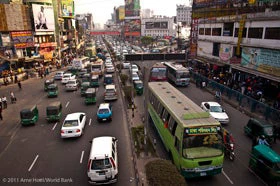
To begin, the foundation of the workshop was set with presentations about the need for an integrated framework to leverage urbanization as a tool, an opportunity, to stimulate economic development and the function of cities. If managed successfully, urbanization efforts can lead the way to higher productivity, earnings, social services and overall, a better quality of life. However, many regions in South Asia see weak institutions and inadequate infrastructure that result in lack of planning, sprawl, and informal housing. To address this challenge, the workshop drew focus to promoting access to affordable land and housing. As Dr. Neten Zangmo, the Minister-in-Charge from the Ministry of Works and Human Settlement from Bhutan urged, ‘The access [to affordable housing] has to be embedded in every country’s philosophy. Not only found in loud statements but needs to be seen in action and bold decisions’. This ambitious task is obviously met with many questions like what defines affordability for a family and what is the appropriate policy intervention? Nevertheless, Songsu Choi from KRIHS urges that the overall objective of housing policy should lie with managing the overall housing supply. However, the reality is that no matter the size of the initial investment, initial housing deficits are inevitable.
The second session of today’s workshop focused on country experiences. They presented general background information but more importantly, challenges that their countries are met with and their goals for moving forward. Not surprisingly, many of these countries are faced with similar problems like land scarcity, congestion, substandard housing, weak institutional coordination, limited finances and lack of planning but it is interesting how many have tackled the problem differently. Some like Bangladesh focus on services like water and sanitation while others have implemented recent housing initiatives for the construction of new residences. Many places have policies and institutions relating to housing in place but proper planning is still lacking or absent. Others like Sri Lanka have plans for housing for the poor but the lack of initial capital hinders the cost recovery process they hope for. Countries are also looking into stimulating the role of private sector in housing developments. Cultural and geographical differences between the countries bring up additional distinctions. For example, Bhutan brought up difficulties with balancing tradition with the new and the loss of social cohesion amongst the community which fits within their efforts for increased national happiness.
Nevertheless, the countries all share similar goals in using this workshop as a platform for idea exchange to hopefully bring forth regulatory changes and provide infrastructure to deliver affordable housing to all and move one step further to a more efficient and inclusive urbanization process in the region.


Join the Conversation